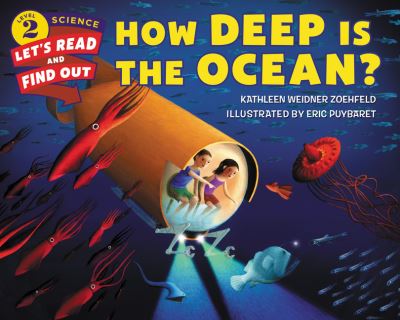
Read and find out about the deepest part of the ocean in this colorfully illustrated nonfiction picture book.
The ocean covers almost three-quarters of the Earth, but how deep does it go? Put on your scuba gear and explore the ocean, from its shallowest waters to its deepest, most mysterious parts. As you dive deeper, you'll discover glowing animals, strange creatures that don't need sunlight to survive, and even the largest hunter in the world.
With beautiful illustrations and engaging text, How Deep Is the Ocean? will guide young readers into the deepest parts of the ocean. Featuring a find-out-more section with a water-pressure experiment, a lesson in making a sounding line to learn how scientists measure the depth of the ocean, a glossary of new terms, and web research prompts, this book will begin children's explorations of the deep sea. Both the text and the artwork were vetted for accuracy by Dr. David Gruber, real-life deep sea explorer and professor of biology and environmental science at Baruch College.
This is a clear and appealing science book for early elementary age kids, both at home and in the classroom. It's a Level 2 Let's-Read-and-Find-Out, which means the book explores more challenging concepts for children in the primary grades. The 100+ titles in this leading nonfiction series are:
Top 10 reasons to love LRFOs:
Books in this series support the Common Core Learning Standards, Next Generation Science Standards, and the Science, Technology, Engineering, and Math (STEM) standards. Let's-Read-and-Find-Out is the winner of the American Association for the Advancement of Science/Subaru Science Books & Films Prize for Outstanding Science Series.
| ISBN: | 9780062328199 |
| Publication date: | 5th July 2016 |
| Author: | Kathleen Weidner Zoehfeld |
| Illustrator: | Éric Puybaret |
| Publisher: | HarperCollinsPublishers an imprint of HarperCollins |
| Format: | Paperback |
| Pagination: | 40 pages |
| Series: | Let's-Read-and-Find-Out. Science. Stage 2 |
| Genres: |
Children’s / Teenage general interest: Wildlife and habitats: Oceans and seas Children’s / Teenage general interest: Ecosystems Children’s / Teenage general interest: Fish and marine life |